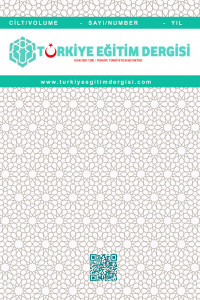Effect of Using Culturally Responsive and Differentiated Concept Cartoons on Students’ Academic Success and Attitude in Science Teaching
multicultural education, concept cartoons, astronomy, academic achievement, attitude
___
- Açıkgöz, K. Ü. (2003). Etkili öğrenme ve öğretme. İzmir: Kanyılmaz Matbaası.
- Avcı, S., & Yüksel, A. (2011). Okuma çemberi yöntemine göre kitap okumanın öğrencilere bilişsel ve duyuşsal katkıları. Kuram ve uygulamada eğitim bilimleri, 11(3), 1285-1300.
- Bayrakçeken, S., Doymuş, K., & Doğan, A. (2013). İşbirlikli öğrenme modeli ve uygulanması. Ankara: Pegem.
- Brabham, E. G., & Villaume, S. (2000). Questions and answers: continuing conversations about literature circles. The Reading Teacher, 54(3), 278-280.
- Briggs, S. (2010). Using literature circles to increase reading comprehension in third grade elementary studens. Unpublished Master Thesis, San Rafael, California: Dominician University of California.
- Burns, B. (1998). Changing the classroom climate with literature circles. Journal of Adolescent & Adult Literacy, 42(2), 124-129.
- Certo, J., Moxley, K., Reffitt, K., & Miller, J. A. (2010). I learned how to talk about a book: children's perceptions of literature circles across grade and ability levels. Literacy Research and Instruction, 49(3), 243-263.
- Creswell, J. (2012). Educational research: planning, conducting, and evaluating quantitative and qualitative research. Boston: Pearson.
- Evans, K. S. (2002). Fifth grade students' perceptions of how they experience literature discussion groups. Reading Research Quarterly, 37(1), 46-69.
- Fraenkel, J., Wallen, N., & Hyun, H. (2011). How to design and evaluate research in education. New York: Mc Graw Hill Publications.
- Güngör, A. (2005). İş birlikli öğrenme yönteminin cinsiyete göre okuduğunu anlama stratejilerinin kullanımı ve okumaya yönelik tutum üzerindeki etkileri. Eurasian Journal of Educational Research, 20, 135-146.
- Hadjioannou, X. (2007). Bringing the backround to the foreground: what do classroom environments that support authentic discussions look like. American Educational Research Journal, 44(2), 370-399. Johnson, D., & Johnson, R. (1999). Learning together and alone. Minnesota: Allyn and Bacon.
- Karakoyun, M. E. (2010). İlköğretim 5. sınıf öğrencilerine noktalama işaretlerinin öğretiminde işbirlikli öğrenme tekniklerinden Jigsaw I’in akademik başarıya etkisi. Yayımlanmamış Yüksek Lisans Tezi: Atatürk Üniversitesi Sosyal Bilimler Enstitüsü.
- Kardaş, M. (2014). İş birlikli ve geleneksel grup çalışmasının dil bilgisi öğretiminde akademik başarıya etkisi. Turkish Studies, 9(8), 603-622.
- King, C. (2001). "I like group reading because we can share ideas": the role of talk within the literature circles. Reading, 35(1), 32-36.
- Mertens, D. (2010). Research and evaluation in education and psychology: integrating diversity with quantitative, qualitative, and mixed methods. Thousand Oaks, California: SAGE Puplications.
- Neamen, M., & Strong, M. (2001). More literature circles: cooperative learning for grades 3-8. Colorado: Libraries Unlimited.
- Saracaloğlu, A., & Karasakaloğlu, N. (2011). Türkçe öğretmenlerinin öğretimde kullandıkları yöntem ve tekniklere ilişkin göüşleri. İlköğretim Online, 10(3), 951-960.
- Straits, W. (2008). A literature circles approach to understanding science as a human endeavor. E. Brunsell içinde, Reading in science methods, k-8: an nsta press journals collection (s. 13-18). Arlington: NSTA Press.
- Temizöz, Y., & Özgün Koca, S. (2008). Matematik öğretmenlerinin kullandıkları öğretim yöntemleri ve buluş yoluyla öğrenme yaklaşımı konusundaki görüşleri. Eğitim ve Bilim, 33(149), 89-103.
- Tracey, D., & Morrow, L. M. (2006). Lenses on reading: an introduction to theories and models. New York: Guilford.
- Yeşilyurt, E. (2013). Öğretmenlerin öğretim yöntemlerini kullanma amaçları ve karşılaştıkları sorunlar. Atatürk Üniversitesi Sosyal Bilimler Enstitüsü Dergisi, 17(1), 163-188.
- Başlangıç: 2016
- Yayıncı: Ali Fuat ARICI
Mustafa Kutlu’nun “Mavi Kuş” Hikâyesindeki Edatlar ve Edatların Türkçe Öğretim Programındaki Yeri
Süleyman AYDENİZ, Ayşe Ebrar YAMAÇ
Türk Çocuk Edebiyatı Eserlerinde Öğütlerin İncelenmesi: Kuşaklar Arası Bir Bakış
Sinem Nur AYHAN, Ali Fuat ARICI
Nur ÜTKÜR GÜLLÜHAN, Derya BEKİROĞLU
Çağdaş ÇETİNKAYA, Fatma GÖK, Ahmet YALKIN
Türkçe Öğretmeni Adaylarının Üstbilişsel Farkındalık Düzeylerinin İncelenmesi
Ortaokul Öğretmenleri Model Oluşturma Etkinlikleri Prensiplerini Derslerinde Nasıl Kullanıyorlar?
Zeynep ARSLAN, Barış DURAN, Merve ÇELENLİ, Zehra TAŞPINAR-ŞENER
Seyyid Ahmet Arvasi'nin Sosyal Bilgiler Değerler Eğitimi Açısından İncelenmesi
Öğretmen Adaylarının “Özel Öğrenme Güçlüğü” Kavramına Yönelik Bilişsel Yapılarının İncelenmesi
Mehmet İNCE, Şule FIRAT DURDUKOCA
Türkçe ve Türk Kültürü 5-8. Seviye Ders Kitaplarındaki Metinlerin Okunabilirlik Yönünden İncelenmesi
